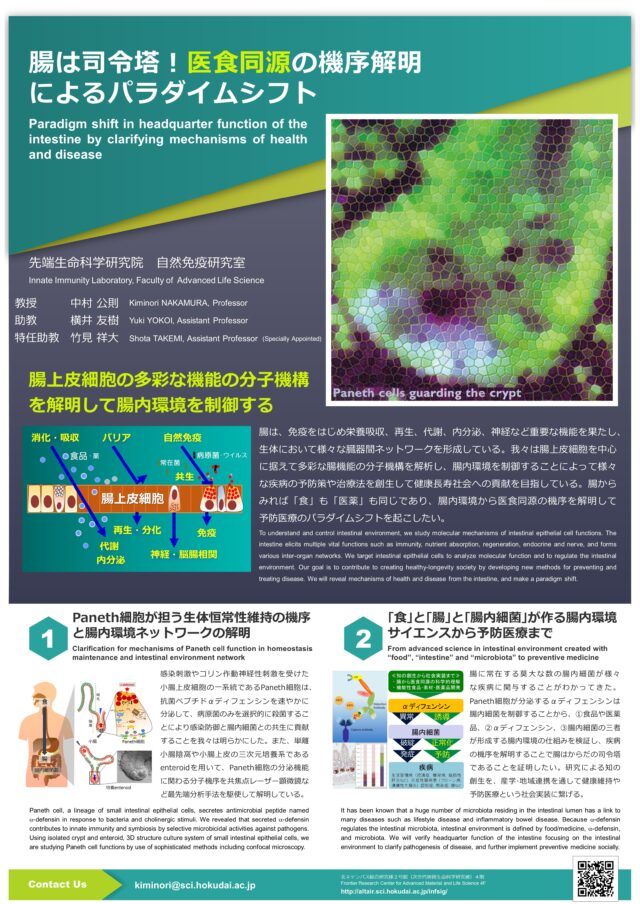Laboratory of Innate Immunity
- Research Theme
- Regulation of innate immunity in mucosal immunity by Paneth cell alpha-defensin / Pathogenesis of inflammatory bowel disease and lifestyle diseases
- Research Keywords
innate immunity, antimicrobial peptide, mucosal immunity, intestinal epithelial cell, Paneth cell, alpha-defensin, stem cell, intestinal microbiota, intestinal environment, inflammatory bowel disease, lifestyle diseases, mental health, aging, cancer, allergy, food and medicine, preventive medicine, therapeutics
Staff
-
NAKAMURA Kiminori Professor
-
YOKOI Yuki Assistant Professor
-
OHIRA Shuya Specially Appointed Assistant Professor
Overview of Research and Education
We have mucosal immunity as a mechanism for ‘elimination of’ and ‘symbiosis with’ microbes. Forty trillions of bacteria live in our intestinal lumen and are involved in maintaining homeostasis of such as immunity, metabolism, and regeneration by forming the intestinal microbiota. Disruption of symbiosis with the intestinal microbiota, dysbiosis, is involved in obesity and aging, and further onset of various diseases such as depression, autism, allergy, and cancer. It is also known that dysbiosis in the mother during pregnancy adversely affects future health of the child. We have been elucidating the mechanism of symbiosis with the intestinal microbiota in the gut mucosal immunity from the structural-function correlations of the antimicrobial peptide α-defensin and the molecular dynamics of its producing cell, Paneth cell. Furthermore, with the better understanding of mechanisms for ‘exclusion’ and ‘symbiosis’, we conduct research to clarify and utilize that immune system regulation originating from intestinal epithelial cells is the scientific basis of so called ‘food and medicine as same origin’. We aim to overcome various diseases in relation to mucosal immunity and intestinal environment during entire life stages from fetus to elderly.
Laboratory of Innate Immunity (pdf)
Practical Subjects
Charge
- Charge (US):
School of Science, Biological Science course (Macromolecular Functions), Core Laboratories - Charge (GS):
Graduate School of Life Science, Division of Life Science, Transdisciplinary Life Science Course, Functional Cellular Sciences
Contact
- Address
- 〒001-0021
North 21 West 11, Kita-ku, Sapporo, Hokkaido - Phone
- 011-706-9051, 9062
- Fax
- 011-706-9053
- kiminori*sci.hokudai.ac.jp (Please replace * with @ when sending e-mail.)
Representative Publications
Yokoi Y, Nakamura R, Ohira S, Takemi S, Ayabe T, Nakamura K. Potential consequences of phototoxicity on cell function during live imaging of intestinal organoids, PLOS ONE 2024. doi.org/10.1371/journal.pone.0313213
Shimizu Y, Yamamura R, Yokoi Y, Ayabe T, Ukawa S, Nakamura K, Okada E, Imae A, Nakagawa T, Tamakoshi A, Nakamura K. Shorter sleep time relates to lower human defensin 5 secretion and compositional disturbance of the intestinal microbiota accompanied by decreased short-chain fatty acid production. Gut Microbes 2023. doi.org/10.1080/19490976.2023.2190306.
Nakamura S, Nakamura K, Yokoi Y, Shimizu Y, Ohira S, Hagiwara M, Song Z, Gan L, Aizawa T, Hashimoto D, Teshima T, Ouellette AJ, Ayabe T. Decreased Paneth cell α-defensins promote fibrosis in a choline-deficient L-amino acid-defined high-fat diet-induced mouse model of nonalcoholic steatohepatitis via disrupting intestinal microbiota. Sci Rep 2023. doi.org/10.1038/s41598-023-30997-y.
Kamioka M, Goto Y, Nakamura K, Yokoi Y, Sugimoto R, Ohira S, Kurashima Y, Umemoto S, Sato S, Kunisawa J, Takahashi Y, Domino SE, Renauld JC, Nakae S, Iwakura Y, Ernst PB, Ayabe T, Kiyono H. Intestinal commensal microbiota and cytokines regulate Fut2+ Paneth cells for gut defense. Proc Natl Acad Sci U.S.A. 2022. doi: 10.1073/pnas.2115230119.
Suzuki K, Nakamura K, Shimizu Y, Yokoi Y, Hagiwara M, Ohira S, Wang Y, Song Y, Aizawa T, Ayabe T. Decrease of alpha-defensin impairs intestinal metabolite homeostasis via dysbiosis in mouse chronic social defeat stress model. Sci Rep 2021. doi: 10.1038/s41598-021-89308-y.
Nakamura K, Yokoi Y, Fukaya R, Ohira S, Shinozaki R, Nishida T, Kikuchi M, Ayabe T. Expression and localization of Paneth cells and their alpha-defensins in the small intestine of adult mouse. Front Immunol 2020. doi: 10.3389/fimmu.2020.570296.
Shimizu Y, Nakamura K, Yoshii A, Yokoi Y, Kikuchi M, Shinozaki R, Nakamura S, Ohira S, Sugimoto R, Ayabe T. Paneth cell alpha-defensin misfolding correlates with dysbiosis and ileitis in Crohn’s disease model mice. Life Science Alliance 2020. doi: 10.26508/lsa.201900592.
Refer to HOKKAIDO UNIVERSITY RESEARCHERS DIRECTORY
Note
Related SDGs;
3. GOOD HEALTH AND WELL-BEING
4. QUALITY EDUCATION
9. INDUSTRY, INNOVATION AND INFRASTRUCTURE
17. PARTNERSHIPS FOR THE GOALS
